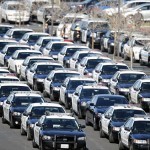Police Response in Kuwait (via OSAC)
 Kuwait’s Ministry of Interior (MOI) maintains a visible police profile with uniformed and plainclothes officers deployed in key locations for response and deterrence. Each district and governorate has police stations operating under the direction of the MOI Directorate of Public Safety.
Kuwait’s Ministry of Interior (MOI) maintains a visible police profile with uniformed and plainclothes officers deployed in key locations for response and deterrence. Each district and governorate has police stations operating under the direction of the MOI Directorate of Public Safety.
U.S. citizens are subject to the country’s laws and regulations, which can differ significantly from those in the United States. Violating Kuwaiti law can result in detention, arrest, prison sentence, fines, and/or deportation. Examples of crimes include possession, use, or trafficking of illegal narcotics, pork, firearms, counterfeit goods, and alcohol.
Photographing government and public buildings, military installations, and economic infrastructure, particularly that related to the oil industry, is against the law. Humiliating/insulting a person, including a police officer or a public official, is a crime similar to disorderly conduct or harassment in the U.S. Proselytizing is prohibited for all religions except Islam. Non-payment of traffic violations or other outstanding debts owed to Kuwaitis may result in travel bans preventing individuals from exiting Kuwait.
If arrested or detained, U.S. citizens should request to speak with the duty officer at the U.S. Embassy through the switchboard operator at (965) 2259-1001. Do not assume your arrest has been reported to the U.S. Embassy. A consular officer will visit the U.S. citizen within 24-72 hours of the initial notification.
Dial 112 to contact police, fire, and ambulance emergency services. Police response to requests for assistance to Americans is generally good. U.S. citizens who do not speak Arabic should request assistance from a bilingual Arabic/English switchboard operator. Be mindful that emergency switchboard operators do receive prank calls frequently and may hang up, if they do not understand the caller. In such cases, callers are advised to call again.
The police accept crime reports at the police station with jurisdiction over the area where the crime occurred. If filing a crime report, it is advisable that the U.S. citizen be accompanied by a person who speaks Arabic and/or by a local attorney; all testimonies must be rendered in Arabic. Filing a crime report can take several hours, as a police investigator will take the victim’s statement orally while composing his investigative report. Although many police investigators are fluent in English, those who do not speak Arabic should be reminded to have an Arabic translator present. In all cases of abuse, the victim must obtain a medical report from a Kuwaiti hospital in order to file a police report.
Source : OSAC
Kuwait News
- Events in Kuwait
- Expat forged 60 visas of domestic workers for KD 20,000
- Guidelines for salons and barber shops
- Departures to increase upto 2,500 per day
- 120,000 Residency violators still in Kuwait
- The Cabinet decides to start fourth phase from Tuesday
- New residency bill for expats
- Inbound flights … end of August
- Plan completed to resume the commercial flights at Kuwait Airport
- Temporary law permitting ‘Salary Cuts’ in Private Sector
- List of shops which are allowed to operate
- 120,000 expats will not be able to ‘renew’ residency
- 3 months extension for all expiring visas; Expats standard abroad grace period of 1 yr instead of 6 months
- Maidan Hawally (Block 11) will not be under Isolation
- Flights Reservations open for Kuwaitis along with domestic workers
- 5 phases to get back to normal Kuwait
- Following services will start from 31.05.2020
- Full lockdown in Farwaniya, Mahboula, Jleeb Al-Shuyoukh, Khaitan, Hawally areas and Partial Curfew from 6pm to 6am
- Guidelines for Banks set for the resumption of work and customers services
- 10 deaths, 845 new infections of coronavirus in Kuwait, total 24,112
- Jleeb, Mahboula isolation to end

Filed in: All • Expats in Kuwait • Info • Local News







